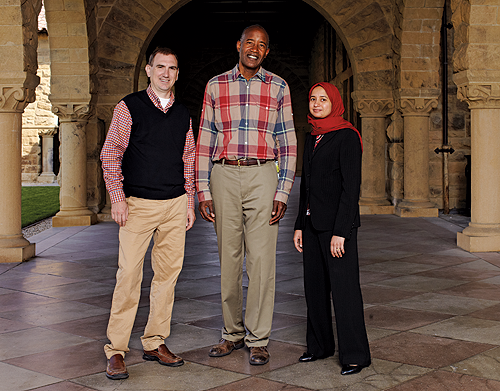New Faculty: James A. Sonne
James A. Sonne
Director, Religious Liberty Clinic, Lecturer in Law
James A. Sonne, the founding director of Stanford Law School’s new Religious Liberty Clinic, arrived this fall with an ambitious agenda: to create the nation’s only law school clinic devoted entirely to litigating issues of religious freedom. He comes well-equipped for the challenge, having spent much of his life studying the intersection of law and faith.

Sonne, who grew up in New Jersey, says he was raised a “religious mutt.” He explains, “My mother’s family was Jewish; my father was a psychoanalyst and nominal Episcopalian. They taught us the natural virtues, but our spiritual affiliation was never clear-cut.”
From this background and what he describes as an uninhibited search for meaning instilled by his parents, Sonne developed an interest in the Catholic Church and its dual emphasis on faith and reason. This interest continued into college, and while studying classics and political science at Duke, he became a Catholic.
At Harvard Law School, Sonne found a mentor in Mary Ann Glendon, arguably the nation’s leading Catholic legal intellectual. Glendon supported Sonne’s budding interest in religious liberty issues, and while in law school he was able to work as a volunteer on cases in this area.
After receiving his JD in 1997, Sonne joined the labor law team at McGuireWoods in Virginia. “I’ve always been fascinated by the human aspects of legal disputes; my early practice allowed me to help resolve deeply personal conflicts in a hands-on way,” he says. Fortuitously, Sonne also got to litigate religious liberty cases, after a senior partner representing faith-based colleges learned of his background.
Although Sonne enjoyed practice, he was drawn to teaching, and in 2001 the opportunity arose to merge that interest with his faith. That year, he joined the newly formed Ave Maria School of Law, whose curriculum combines standard legal education with the Catholic intellectual tradition. At Ave Maria, Sonne wrote on law and religion in the workplace, won teaching awards, and earned tenure. More importantly, he met his wife, who, though also a lawyer, presently runs what Sonne calls a “boutique firm of four demanding little clients—our kids!”
. . . . . . . . . . . . . . . .
IN 2008, AVE MARIA ANNOUNCED IT WAS RELOCATING, and Sonne paused to evaluate whether to remain in academia or return to practice. He then made an unusual move, accepting a clerkship with Judge Edith Brown Clement of the U.S. Court of Appeals for the Fifth Circuit. Sonne says, “I regretted not clerking after law school; Ave Maria’s transition gave me a chance to address that. We had a great year in New Orleans and clerking for Judge Clement was amazing.”
After his clerkship, the family moved to California. Sonne joined Horvitz & Levy, a prestigious appellate firm, and thought he had settled into a long career there. But Sonne could not resist the chance to start the Religious Liberty Clinic when he heard about the idea last fall. Sonne marvels, “I get to do what I love—teach, litigate, write—in the subject closest to my heart—and at Stanford. Wow!”
The clinic, which opens in January as the newest member of Stanford Law School’s Mills Legal Clinic, will represent clients holding a wide variety of beliefs in a broad range of circumstances. Cases will include disputes over prisoners’ religious observances, workplace accommodations, and public exercises of religion—all of which Sonne believes promise fantastic learning opportunities for students.
“As our society diversifies,” Sonne explains, “we must expose students to the fundamental importance of religious freedom. Even if they later choose another area of practice, the lessons students will learn by serving clinic clients, many with beliefs unfamiliar to or at odds with the students’ own experience, will prove invaluable to their future work and life.”
Sonne stresses that the clinic is apolitical. He also notes, “It’s not a religion clinic; it’s a religious liberty clinic. Particular beliefs are secondary. If there’s no religious freedom for one, there’s no religious freedom for all.” Sonne cites as a model the Becket Fund for Religious Liberty, a public- interest firm that helped fund the clinic’s launch. As Sonne explains, “It represents everyone from Anglicans to Zoroastrians with excellence and integrity; we plan to do the same.” To learn more about SLS clinics, go to www.law.stanford.edu/organizations/clinics/religious-liberty-clinic. SL
